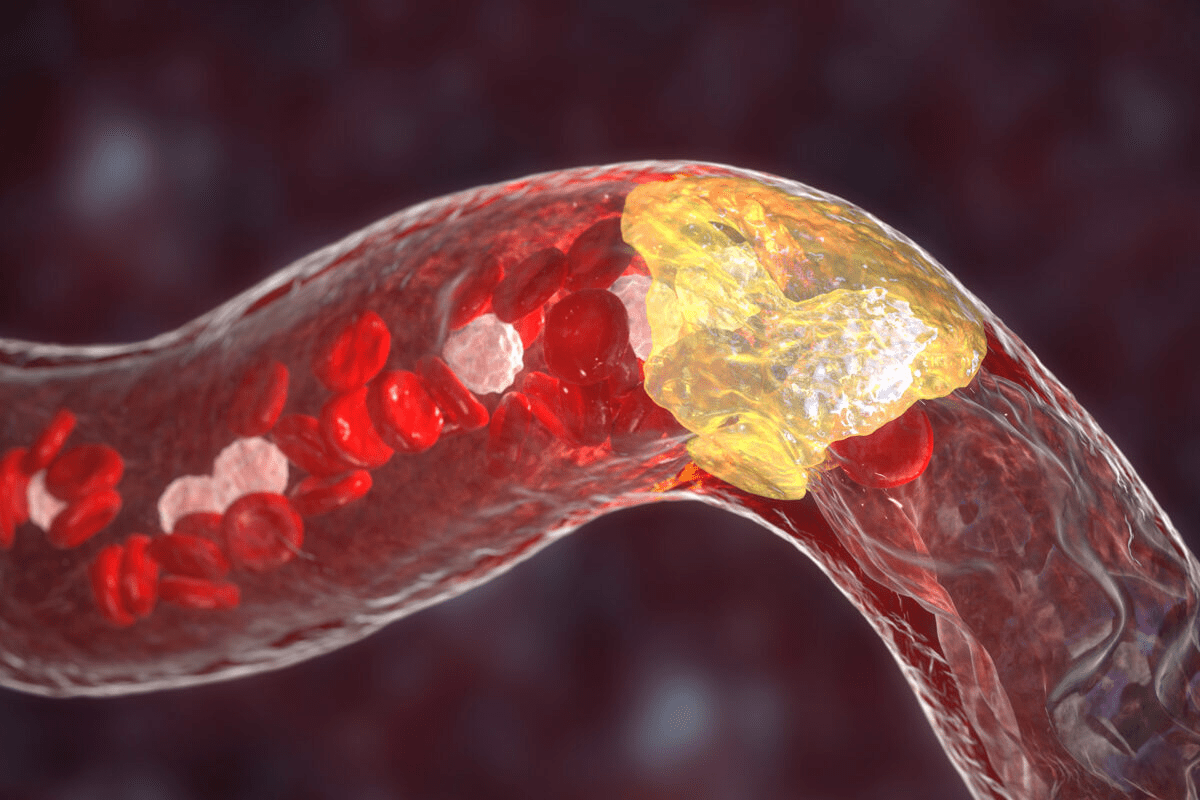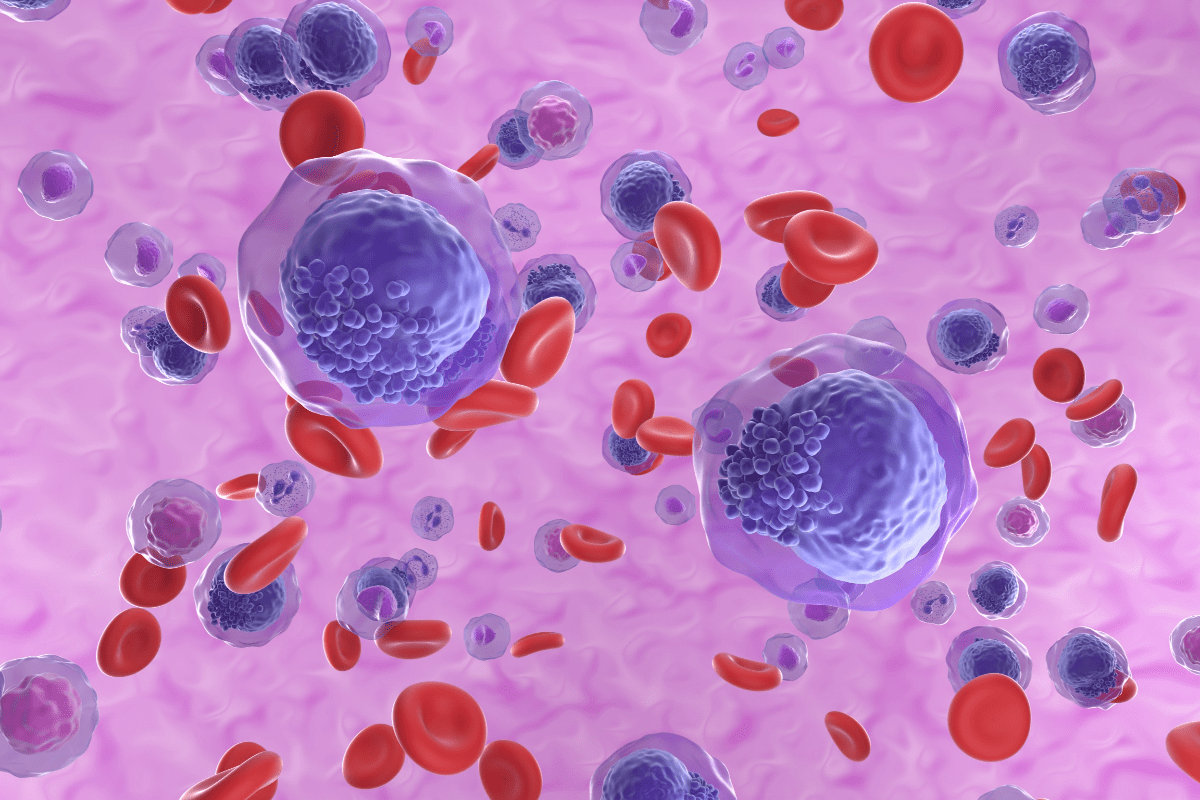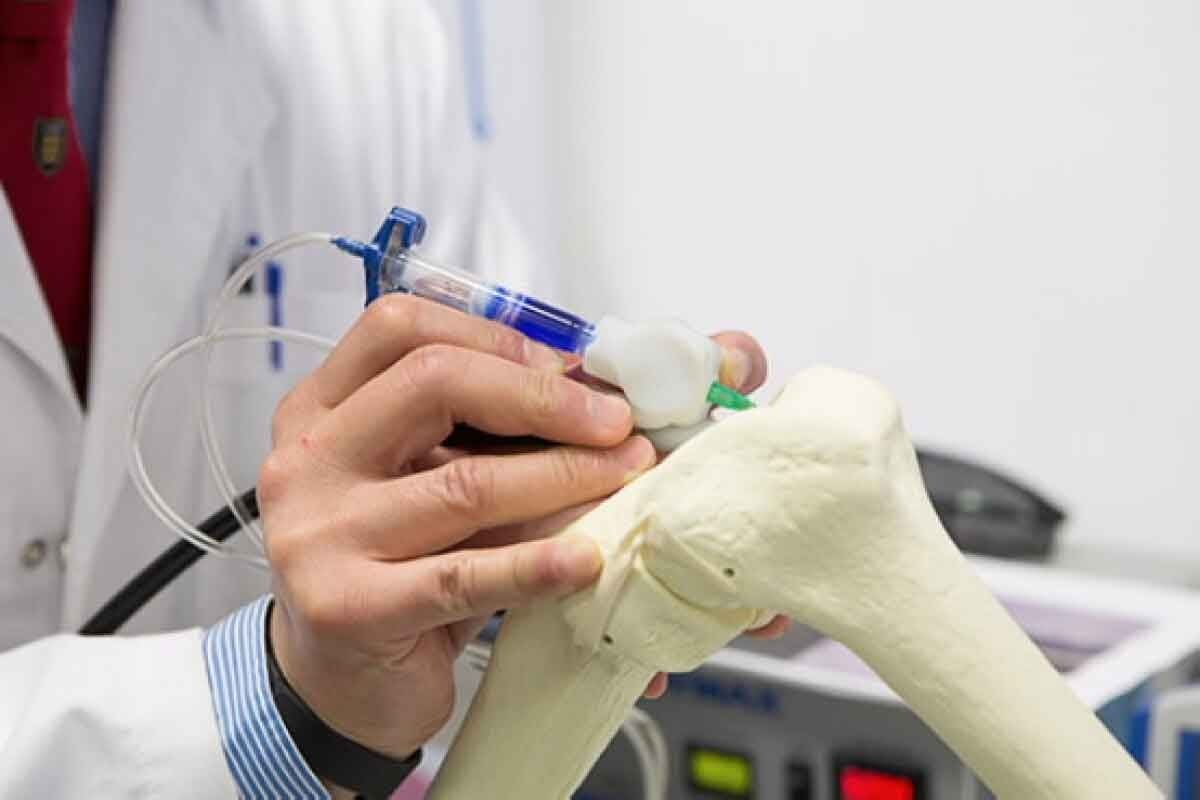Last Updated on November 27, 2025 by Bilal Hasdemir

Getting a CT scan is a big step in finding and treating health issues. But, some people might feel sick after the procedure. At Liv Hospital, we make sure you know what to expect.
Understanding common side effects can make you feel better. Medical experts say these side effects are usually mild and don’t last long, even with contrast dye. We’ll talk about the usual side effects of CT scans and what you should expect. Feeling unwell after ct scan “ Learn why you might feel unwell after a CT scan and what steps to take for relief.
Key Takeaways
- Common side effects of CT scans are usually mild and temporary.
- Contrast dye can cause some side effects in certain individuals.
- Understanding what to expect can reduce anxiety.
- Liv Hospital is committed to patient care and support.
- Knowing the possible side effects can help you prepare.
What Is a CT Scan and When Is It Used?
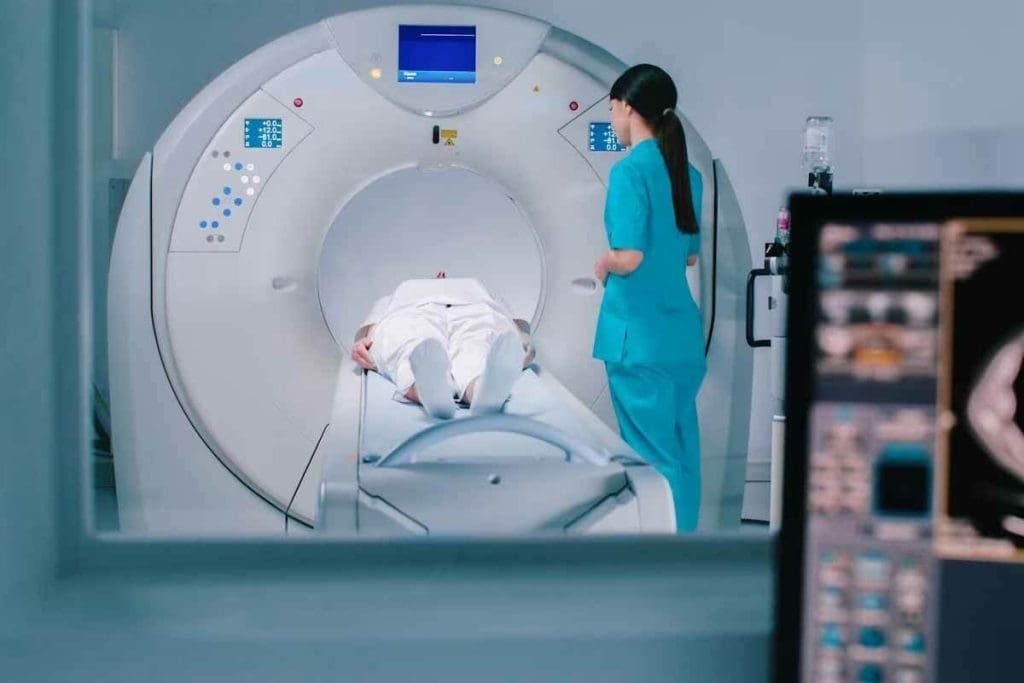
Computed Tomography (CT) scans are key in modern medicine. They give detailed images of the body’s inside. This helps doctors diagnose and treat many health issues.
The Technology Behind CT Imaging
CT scans use X-rays and computers to show the body’s inside. An X-ray machine moves around the body, taking pictures from different sides. A computer then makes detailed images from these pictures.
This technology is advanced, allowing for quick images. This is very helpful in emergencies when fast diagnosis is needed.
Diagnostic Capabilities of CT Scans
CT scans are great for finding many health problems. They show images of organs, bones, and soft tissues. This helps doctors spot issues that regular X-rays can’t.
Using contrast agents makes CT scans even better. These agents highlight certain areas, giving more information for diagnosis.
When Doctors Recommend CT Imaging
Doctors suggest CT scans for many reasons. They help find the cause of symptoms, guide procedures, and check if treatments are working. CT scans are best when other tests, like X-rays or ultrasound, aren’t enough.
We suggest CT scans when a detailed look inside the body is needed. This is to make an accurate diagnosis or plan the right treatment.
Feeling Unwell After CT Scan: Why It Happens
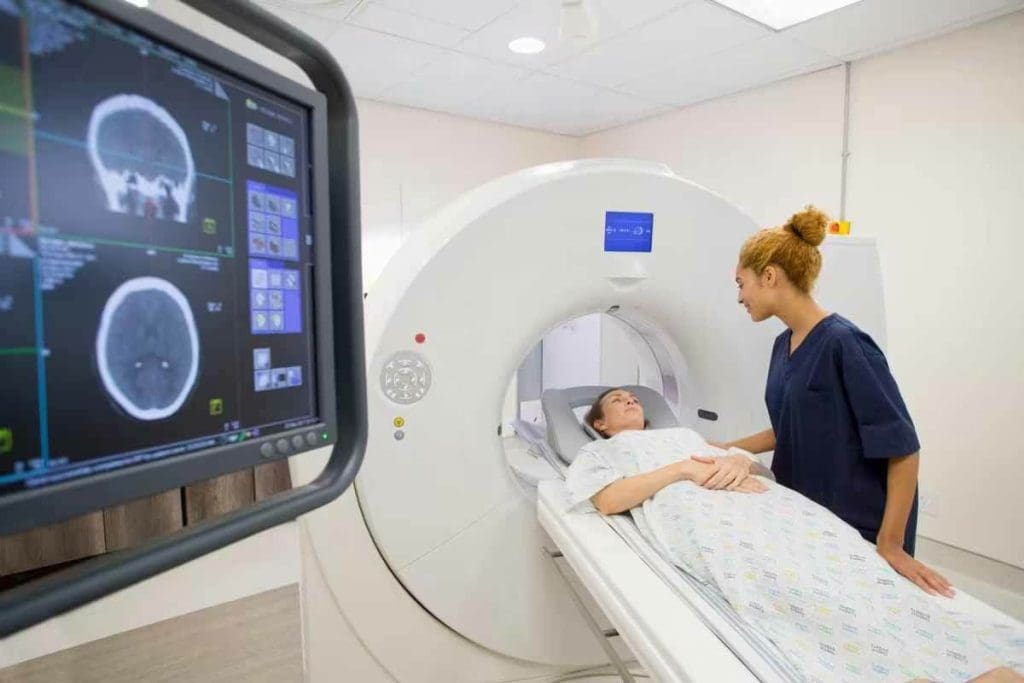
Many people feel sick after a CT scan. There are several reasons for this. We will look at reactions to contrast dye, anxiety and claustrophobia, and personal risk factors.
Common Reactions to Contrast Dye
Contrast dye is often used in CT scans. Contrast dye reactions can cause nausea, vomiting, and itching. Most reactions are mild but can be serious.
Studies show that contrast-induced adverse effects happen to some people. Knowing about these risks can help manage anxiety. Talk to your doctor about any concerns before the scan.
Psychological Factors: Anxiety and Claustrophobia
Psychological factors are important in how people feel during a CT scan. Anxiety and claustrophobia can make the experience uncomfortable. The closed space of the scanner can trigger or worsen these feelings.
There are ways to help with anxiety and claustrophobia. Relaxation, breathing exercises, and sedation can help. Talk to your doctor about your fears to find the best solution.
Individual Risk Factors for Post-Scan Discomfort
Some people are more likely to feel sick after a CT scan. Those with kidney disease or other health issues may face more risks. Age and overall health also play a role.
Following pre-scan instructions and telling your doctor about your health is key. This helps reduce risks and ensures a better outcome.
7 Common Symptoms You May Experience After a CT Scan
After a CT scan, some people might notice certain reactions. CT scans are usually safe, but some might feel side effects. Here are the common symptoms you might face after a CT scan.
Nausea and Vomiting
Nausea is a common side effect, more so when contrast dye is used. The contrast agent can upset your stomach, causing nausea or vomiting. If you keep feeling sick, tell your doctor right away.
Headache and Dizziness
Some people might feel headaches or dizziness after a CT scan. These can be due to the contrast dye or being in the scanner for a long time. If you often get headaches, you might feel these symptoms more.
Metallic Taste in Mouth
Some might notice a metallic taste after a CT scan, if dye was used. This taste usually goes away soon after the scan.
Skin Reactions and Itching
Some patients might get skin reactions or itching after a CT scan. These are often because of the dye and can be mild or severe. If you get any skin issues, tell your doctor.
Not everyone will feel these symptoms, and they are usually mild and short-lived. But, if you’re worried or if symptoms last, talk to your doctor.
What to Expect During a CT Scan: The Complete Procedure
Knowing what happens during a CT scan can make you feel less nervous. We’ll walk you through each step, from getting ready to finishing the scan. This will help you feel more at ease and informed.
Before You Enter the Scanning Room
You’ll likely be asked to change into a hospital gown before the scan. This is to make sure your clothes don’t get in the way. You might also need to take off any jewelry or metal items. We’ll keep your things safe for you.
Getting ready is important for a good CT scan. Try to arrive 30 minutes early. This gives you time to fill out any paperwork and get ready.
Positioning and Scanner Operation
When you’re ready, you’ll lie on a table that moves into the CT scanner. Our radiographers will make sure you’re comfortable and in the right spot. The scanner is a big, doughnut-shaped machine that moves around you, taking pictures from different angles.
- The table will move slowly through the scanner’s opening.
- You might need to hold your breath for a few seconds to get clear images.
- Our staff will talk to you through an intercom during the scan.
Duration and Sensations During the Scan
A CT scan usually takes 10 to 30 minutes, depending on how complex it is. You might hear sounds as the scanner works. It’s important to stay very quiet and not move during this time.
You might feel a bit cool if you get contrast dye. Our team will watch over you to make sure you’re comfortable and safe.
Immediate Post-Scan Protocol
After the scan, you’ll be helped off the table. Our staff will check that you’re okay before you leave. If you got contrast dye, you might need to drink lots of water to get it out.
We’ll give you instructions on what to do after the scan and answer any questions. We want to make sure your experience is smooth and stress-free.
CT Scan Preparation: Can I Eat Before a CT Scan?
To get the most out of your CT scan, it’s key to follow specific preparation guidelines. Proper preparation ensures the scan’s accuracy and minimizes discomfort or complications.
Fasting Requirements for Different Types of CT Scans
Fasting needs can change based on the CT scan type. For scans with contrast dye, fasting for a few hours before is often required. It’s vital to follow your doctor’s fasting instructions, as eating or drinking before some scans can impact image quality or interact with the contrast agent.
For example, if you’re getting a CT scan with contrast, fasting for 2-4 hours is common. But, for other scans, eating before might be okay or even suggested to keep your blood sugar stable.
Hydration Guidelines Before and After
Staying hydrated is key, even more so if contrast dye is used. Drinking lots of water before and after helps flush out the dye, lowering side effect risks.
Usually, patients are told to drink lots of water before and after the scan. But, it’s important to follow your healthcare provider’s hydration advice. They might have special instructions based on your health and the scan type.
Medication Considerations
If you’re on medications, tell your healthcare provider before the CT scan. Some meds might need to be adjusted or stopped before the scan, mainly if it’s with contrast.
Dress Code for CT Scans: Jewelry, Metal, and Clothing Restrictions
When you’re getting ready for a CT scan, knowing the dress code is key. It makes sure you’re comfortable and the scan goes well. What you wear can affect how clear the images are.
Can I Wear a Bra During a CT Scan?
Many people wonder if they can wear a bra for a CT scan. It depends on the bra. If it has metal, like underwire, it’s best to take it off. This helps avoid messing up the scan images.
Some places might give you a gown to wear. But, it’s smart to ask your doctor or the imaging center first. They’ll tell you what’s best.
Jewelry and Piercings: What to Remove
Any jewelry or piercings with metal need to go before a CT scan. This includes earrings, necklaces, and rings. It’s important to remove these to avoid problems with the scan.
If taking out piercings is hard, talk to your doctor. They can help you figure out how to prepare without too much pain.
Clothing Recommendations for Maximum Comfort
Wear loose, comfy clothes for your CT scan. Try to avoid anything with metal, like zippers or buttons. If you’re not sure, go for something simple and metal-free.
This way, you’ll be comfortable and the scan will get the best images. If you’re unsure about what to wear, ask your doctor or the imaging center. They’re there to help you get ready and make the process easy.
Understanding CT Scan with Dye: Benefits and Risks
Contrast dye is a key part of CT scans. It helps make images clearer by showing the body’s inner parts better. This is important for getting accurate diagnoses.
How Contrast Enhances Diagnostic Accuracy
Contrast dye makes certain body parts stand out during a CT scan. This makes it easier to see tissues, blood vessels, or organs. It’s great for spotting tumors, vascular diseases, and inflammation.
Enhanced diagnostic accuracy comes from the dye’s ability to show different body parts. This is key for finding out how serious a disease is. It helps doctors decide the best treatment.
Potential Kidney Function Concerns
Using contrast dye can be risky for the kidneys. People with kidney problems or at risk might face kidney damage. We check each patient’s kidneys before using the dye to lower this risk.
To protect the kidneys, we tell patients to drink lots of water before and after the scan. For those with very bad kidney problems, we might choose other imaging methods.
Allergic Reactions: Frequency and Severity
Allergic reactions to contrast dye are rare but can happen. They can be mild, like itching, or severe, like anaphylaxis. We look for patients who might be more likely to have an allergic reaction.
If an allergic reaction happens, our team is ready to act fast. Prompt treatment can make the reaction less severe and keep the patient safe.
Who Should Avoid Contrast Agents?
Some people should not get contrast dye because of health risks. This includes those with severe kidney disease, a history of dye allergies, and pregnant women. We check each patient’s health history to find the safest option for their CT scan.
If a CT scan with dye is not safe, we look for other ways to get the needed information. This helps avoid risks.
When to Seek Medical Help After Your CT Scan
Knowing when to seek medical help after a CT scan is key to a smooth recovery. CT scans are usually safe, but some people might have bad reactions or complications. It’s important to know the signs that mean you need to see a doctor.
Normal vs. Concerning Symptoms
After a CT scan, feeling a bit off or having minor side effects is common. For example, if you had contrast dye, you might taste metal. But, some symptoms are serious and need medical help. These include:
- Persistent nausea or vomiting
- Severe headache or dizziness
- Skin reactions such as rashes or itching
- Difficulty breathing
If you’re not sure if your symptoms are normal or not, it’s best to be safe. Always talk to your healthcare provider.
Emergency Warning Signs
Very rarely, a CT scan can cause a severe allergic reaction to the contrast dye. If you see any of these emergency signs, get help right away:
- Swelling of the face, lips, tongue, or throat
- Severe difficulty breathing or wheezing
- Rapid heartbeat or palpitations
- A sudden drop in blood pressure
Call emergency services or go to the nearest emergency room if you experience any of these life-threatening symptoms.
Who to Contact with Post-Scan Concerns
If you’re worried about symptoms after a CT scan, know who to call. Usually, you should contact:
- The radiology department where you had your CT scan
- Your primary care physician or the doctor who ordered the CT scan
- Emergency services if you’re experiencing severe or life-threatening symptoms
Remember, it’s always better to be safe than sorry. If you’re unsure about your symptoms or have questions about your CT scan results, don’t hesitate to reach out to your healthcare provider for advice.
By staying informed and alert, you can ensure your safety and well-being after a CT scan. If you have any concerns or questions, don’t hesitate to reach out to your healthcare team for support and guidance.
Recovery Tips: Managing Discomfort After Your CT Scan
Recovering from a CT scan is more than just waiting for your body to heal. It involves taking proactive steps to manage any discomfort. While CT scans are generally safe, some patients may feel side effects or anxiety. By following simple recovery tips, you can reduce discomfort and ensure a smooth recovery.
Hydration Strategies
Drinking plenty of water is key to managing discomfort after a CT scan. It helps flush out the contrast dye, reducing kidney problems and other complications. Drink at least 8-10 glasses of water in the 24 hours after your CT scan. You can also hydrate with electrolyte-rich drinks like coconut water or sports drinks to replace lost salts.
Rest and Activity Recommendations
Rest is essential after a CT scan. Your body needs time to recover, and too much activity can make discomfort worse. Take it easy for the rest of the day, avoiding heavy lifting, bending, or exercise. Short walks can help circulation and aid in recovery.
Over-the-Counter Remedies for Common Symptoms
Some patients may feel nausea, headache, or dizziness after a CT scan. Over-the-counter remedies can help. For nausea, try anti-nausea medication or ginger-based products. For headaches, over-the-counter pain relievers like acetaminophen or ibuprofen can be effective. Always follow the recommended dosage and talk to your doctor if you’re unsure about any medication.
By following these recovery tips, you can reduce discomfort and ensure a smooth recovery after your CT scan. Stay hydrated, rest well, and use over-the-counter remedies as needed. If you have severe or persistent symptoms, contact your healthcare provider for guidance.
Special Considerations for Different Patient Groups
Understanding the needs of different patients is key to safe and effective CT scans. Pregnant women, children, and those with chronic conditions need special care. This ensures the benefits of the scan outweigh the risks.
Pregnant Women and CT Scans
Pregnant women face unique challenges with CT scans due to risks to the fetus. We carefully consider if a scan is necessary. If it is, we use the lowest dose of radiation and look for alternatives.
Shielding the abdomen and pelvis with a lead apron is a standard practice to minimize fetal exposure.
Deciding on a CT scan during pregnancy involves weighing benefits against risks. We work with obstetricians to make decisions that protect both mother and fetus.
Children Undergoing CT Imaging
Children are more sensitive to radiation than adults. So, we adjust CT scan protocols for them. We use child-sized doses of contrast and radiation, based on their age and size.
We also try to reduce anxiety and discomfort in children. This might include sedation or distraction techniques to keep them calm during the scan.
Patients with Chronic Conditions
Patients with chronic conditions need special care with CT scans, like kidney disease or diabetes. We check kidney function before using contrast to avoid kidney problems.
We also look at how their medications might interact with the CT scan. This careful approach ensures safe and effective care for them.
Conclusion: Balancing the Benefits and Risks of CT Scans
CT scans are a key tool for doctors to diagnose health issues. But, they also have risks like radiation and allergic reactions to dye. Studies show a CT scan can give more radiation than an X-ray, leading to thousands of cancers each year in the U.S. For more on CT scan risks, check out this study.
To weigh the good and bad of CT scans, it’s vital to know when they’re needed. Also, follow prep steps like fasting and staying hydrated. Be aware of dye allergies and know when to get help.
By knowing the risks and taking steps to reduce them, patients can get the most from CT scans. Always talk to your doctor about any worries. This way, you get the best care possible.
FAQ
What is a CT scan and what is it used for?
A CT (Computed Tomography) scan makes detailed images of the inside of your body. It looks at organs, bones, soft tissue, and blood vessels. Doctors use it to find and track many health issues, like injuries and cancers.
Can I eat before a CT scan?
It depends on the scan type. For some, you might need to fast. For others, you can eat as usual. Always follow what your doctor tells you.
Can I wear jewelry or metal during a CT scan?
No, take off any jewelry or metal before the scan. This includes earrings, necklaces, and piercings. They can mess with the scan.
What happens during a CT scan?
During a CT scan, you lie on a table that moves into a big machine. The machine takes X-ray images from all sides. It’s fast and doesn’t hurt.
Is it normal to feel unwell after a CT scan?
Yes, some people might feel sick or dizzy after a scan. This is more common if dye was used. But these feelings usually go away quickly.
What are the benefits of using contrast dye during a CT scan?
Contrast dye makes CT scans better by showing certain body parts clearly. This helps doctors find problems easier.
Can I wear a bra during a CT scan?
It’s best to remove bras with metal parts. You might get a gown to wear instead.
How can I manage discomfort after a CT scan?
Drink water, rest, and follow your doctor’s advice to feel better. They might suggest over-the-counter medicines for certain symptoms.
When should I seek medical help after a CT scan?
If you have bad symptoms like trouble breathing, severe pain, or an allergic reaction, get help right away.
Are there any special considerations for pregnant women undergoing a CT scan?
Yes, pregnant women should talk to their doctor before a scan. They’ll check the risks and might suggest other imaging options.
What are the risks associated with CT scans?
CT scans are mostly safe but involve radiation and sometimes dye. Risks include dye allergies and radiation, more for kids and those having many scans.
References
- Mulder, Q., et al. (2020). Cardiac computed tomography angiography”A review of modalities and limitations. The Journal of Nuclear Cardiology, 27(6), 2157-2170. https://www.uscjournal.com/articles/cardiac-computed-tomography-angiography-comparison-other-modalities?language_content_entity=e


